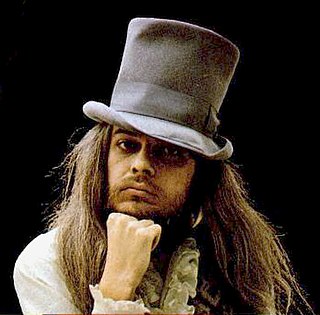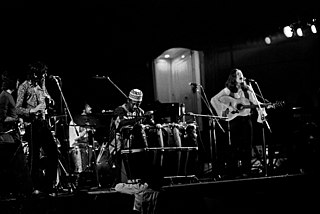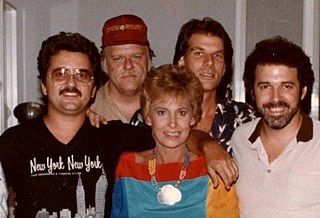
MCA Records was an American record label owned by MCA Inc., which later became part of Universal Music Group.

John Weldon "J. J." Cale was an American guitarist, singer, and songwriter. Though he avoided the limelight, his influence as a musical artist has been acknowledged by figures such as Neil Young, Mark Knopfler, Waylon Jennings, and Eric Clapton, who described him as one of the most important artists in rock history. He is one of the originators of the Tulsa sound, a loose genre drawing on blues, rockabilly, country, and jazz.

Leon Russell was an American musician and songwriter who was involved with numerous bestselling records during his 60-year career that spanned multiple genres, including rock and roll, country, gospel, bluegrass, rhythm and blues, southern rock, blues rock, folk, surf and the Tulsa sound. His recordings earned six gold records and he received two Grammy Awards from seven nominations. In 1973 Billboard Magazine named Russell the "Top Concert Attraction in the World". In 2011, he was inducted into both the Rock and Roll Hall of Fame and the Songwriters Hall of Fame.

David Hood is an American musician, hailing from Muscle Shoals, Alabama, He is known for playing the bass guitar and trombone, and is a member of the Alabama Music Hall of Fame.

Universal Music Group Nashville is Universal Music Group's country music subsidiary. It was officially opened on New Year's Day 1945 as MCA Nashville and Mercury Nashville which on New Year's Day 1950 as Capitol Nashville. Some of the labels in this group include MCA Nashville Records, Mercury Nashville Records, Lost Highway Records, Capitol Records Nashville and EMI Records Nashville. UMG Nashville not only handles these imprints, but also manages the country music catalogues of record labels Universal Music and predecessor companies acquired over the years including ABC Records, Decca Records, Dot Records, DreamWorks Records, Kapp Records, MGM Records and Polydor Records.
The Tulsa sound is a popular musical style that originated in Tulsa, Oklahoma, during the second half of the twentieth century. It is a mix of blues, blues rock, country, rock and roll and swamp pop sounds of the late 1950s and early 1960s. Artists considered to have pioneered the Tulsa sound include J. J. Cale, Leon Russell, Roger Tillison and Elvin Bishop. After 1980, Gus Hardin (country), and Jeff Carson (country) released roots music albums. Although Dwight Twilley is from Tulsa, his power pop style bears no resemblance to the Tulsa sound; likewise, David Gates' most recognized songs were mostly in the soft rock genre.
Dwight Twilley was an American pop/rock singer and songwriter, best known for the top 20 hit singles "I'm on Fire" (1975) and "Girls" (1984). His music is associated with the power pop style. Twilley and Phil Seymour performed as the Dwight Twilley Band through 1978, and Twilley performed as a solo act afterwards.

Philip Warren Seymour was an American drummer, singer, guitarist and songwriter, best known for the singles "I'm on Fire", his own solo hit "Precious to Me" and for providing backing vocals on Tom Petty's hits "American Girl" and "Breakdown." His solo work is revered among fans of power pop.
Dennis Cordell-Lavarack, known as Denny Cordell, was an English record producer. He is notable for his mid-1960s and early 1970s productions of hit singles for The Moody Blues, Leon Russell, The Move, Procol Harum, Joe Cocker and Tom Petty and the Heartbreakers. He later became a racehorse trainer.

Don Preston is an American guitarist, singer, and songwriter whose performing career began in the 1950s. He notably recorded in the 1970s with Leon Russell on Leon Russell and the Shelter People and other albums, and with Joe Cocker on Mad Dogs and Englishmen. He backed Russell at George Harrison's Concert for Bangladesh in August 1971 and appeared in the documentary film and on the live album The Concert for Bangladesh.

Sincerely is the debut album from the Dwight Twilley Band, released in 1976 on Shelter Records. The band consisted solely of Dwight Twilley and Phil Seymour, although touring band member Bill Pitcock IV played lead guitar on every song except for "Sincerely" itself. The album credited production to Oister, which was the original name of the Dwight Twilley Band; later reissues have credited production directly to Twilley and Seymour.

Twilley Don't Mind is the second album from the Dwight Twilley Band, recorded and released in 1977 on Shelter Records, distributed at the time by Arista Records. The band consisted of Dwight Twilley, Phil Seymour, and Bill Pitcock IV. The original album credited production to Oister, which was the original name of the Dwight Twilley Band, and Bob Schaper; later reissues have credited production directly to Twilley, Seymour and Schaper.

The Great Lost Twilley Album is a compilation of songs from the Dwight Twilley Band and Dwight Twilley solo, recorded in 1974 through 1980 and released in 1993 on Shelter Records. The basic band consisted of Dwight Twilley, Phil Seymour, and Bill Pitcock IV ; other musicians include Leon Russell, Tom Petty and Susan Cowsill. Most of the production is credited to Twilley and Seymour, although some other producers who worked on songs on the record include Jack Nitzsche, Leon Russell, Robin Cable and Chuck Plotkin.

Barry Edward Beckett was an American keyboardist, session musician, record producer, and studio founder. He is best known for his work with David Hood, Jimmy Johnson, and Roger Hawkins, his bandmates in the Muscle Shoals Rhythm Section, which performed with numerous notable artists on their studio albums and helped define the "Muscle Shoals sound".
The Right Stuff Records is an American reissue record label that was part of EMI, which is now owned by Universal Music Group and is based out of Santa Monica, California.

The Rocket Record Company is a record label founded by Elton John, along with Bernie Taupin, Gus Dudgeon, Steve Brown and others, in 1973. The company was named after the hit song "Rocket Man". The label was originally distributed in the UK by Island and in the US by MCA Records, both of which Elton John was also signed to.
Paradise Records was an American record label founded by Leon Russell in 1976 in Burbank, California.

The Church Studio is a recording studio in Tulsa, Oklahoma established in 1972 by musician, songwriter, and producer Leon Russell. Located in a converted church building, the studio has since been cited as being the heart of the Tulsa Sound.

Hank Wilson's Back Vol. I is an album by singer and songwriter Leon Russell singing as Hank Wilson. The UK edition has a banner printed on the front of the sleeve to the right of Russell's stetson saying "Leon Russell!", presumably as a marketing initiative to promote the album using the strength of Russell's name.

Stop All That Jazz is an album by singer and songwriter Leon Russell. The album was recorded in 1974 at Russell's House Studio in Tulsa, Oklahoma; Paradise Studios in Tia Juana, Oklahoma; Pete's Place in Nashville, Tennessee; and Shelter The Church Studio, in Tulsa. Stop All That Jazz is Russell's sixth solo album.















